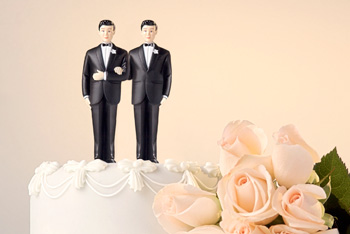 June 9, 2014 – A federal judge in Madison has ruled that Wisconsin’s constitutional marriage amendment, which doesn’t allow same-sex marriages to be recognized in Wisconsin, is unconstitutional despite an argument that federalism should prevail.
June 9, 2014 – A federal judge in Madison has ruled that Wisconsin’s constitutional marriage amendment, which doesn’t allow same-sex marriages to be recognized in Wisconsin, is unconstitutional despite an argument that federalism should prevail.
In addition, Judge Barbara Crabb of the U.S. District Court for the Western District of Wisconsin denied the defenses presented by Gov. Scott Walker, Attorney General J.B. Van Hollen, and other state officials charged with enforcing the state’s marriage amendment, which voters passed by statewide referendum back in 2006.
One of those defenses was based on federalism, the principle that states should be left to make democratic determinations, including whether the state wants to recognize same-sex marriage. Wisconsin’s citizens made that determination, defendants argued.
But in Borden v. Walker, decided last Friday (June 6), Judge Crabb said states cannot be left to “experiment” with social policies that violate the constitution. Federalism cannot trump due process and equal protection rights, Judge Crabb explained.
“Although Wisconsin’s same-sex marriage ban was approved by a majority of voters, is part of the state constitution and deals with a matter that is a traditional concern of the states, none of these factors can immunize a law from scrutiny under the United States Constitution,” wrote Judge Crabb in an 88-page opinion.
The plaintiffs in the case, eight same-sex couples who were either married outside Wisconsin or wanted to legally obtain Wisconsin marriage licenses, argued Wisconsin’s marriage amendment – which defines marriage as between a man and a woman – violated both the Due Process and Equal Protection clauses of the U.S. Constitution.
The defendants made numerous arguments to defend the ban. However, Judge Crabb rejected all of them, noting that marriage is a “fundamental right” and due process and equal protection prohibit the state from denying same-sex couples the right to marry.
Judge Crabb is waiting to rule on whether the same-sex marriage ban should remain effective pending appeal, and is holding a June 19 hearing on the matter. Van Hollen asked Crabb for a stay of the decision, as well as the Seventh Circuit Court of Appeals.
Since Friday, more than 300 marriage licenses have been issued to same-sex couples in Milwaukee and Dane counties, according to reports. In the absence of guidance from Crabb, counties were deciding whether or not to issue same-sex marriage licenses.
Under the ruling, Wisconsin became the 27th state in which same-sex marriage is now legal or where a judge has invalidated a same-sex marriage ban.
Fundamental Right to Marry
Judge Crabb ruled that the Due Process Clause of the Fourteenth Amendment – which prohibits states from depriving persons of life, liberty, or property without due process of law – is implicated because “liberty” includes the fundamental right to marry.
She said burdening fundamental rights is prohibited unless the state has sufficiently important state interests to impose the burden without a reasonable alternative.
The defendants, and the amicus brief filed by Wisconsin Family Action, argued that the fundamental right to marry does not include the right to marry someone of the same sex, because marriage is consistently linked to procreation. Judge Crabb disagreed.
“First, gay persons have the same ability to procreate as anyone else and same-sex couples often raise children together, so there is no reason why a link between marriage and procreation should disqualify same-sex couples,” Judge Crabb wrote.
“Second, although the Supreme Court has identified procreation as a reason for marriage, it has never described procreation as a requirement,” she wrote.
Judge Crabb also rejected the defendants’ claim that fundamental rights are only those that are “deeply rooted” in the country’s legal tradition, and same-sex marriage is not.
Crabb noted that contraception and abortion were not deeply rooted traditions when the U.S. Supreme Court recognized those rights as constitutionally protected.
Judge Crabb also rejected the argument that same-sex couples cannot fit into the definition of marriage because the “nature of marriage” is between men and women.
“[T]he argument simply reveals another similarity between the objections to interracial marriage and amici’s objections to same-sex marriage,” Crabb wrote.
“In the past, many believed that racial mixing was just as unnatural and antithetical to marriage as amici believe homosexuality is today.”
No Legitimate State Interest
Recognizing that same-sex couples have a constitutionally protected right to marry, Judge Crabb ruled that Wisconsin has unconstitutionally burdened that right.
The state’s purported interests of preserving tradition, protecting the institution of marriage, and promoting optimal child-rearing are not good enough, Crabb noted.
“I conclude that defendants have failed to show that the ban furthers a legitimate state interest,” Crabb wrote. “These interests are essentially the same as those asserted by other states in other cases around the country involving similar laws.”
Judge Crabb also rejected the defendants’ argument that Wisconsin can reasonably choose to “proceed with caution” and see how other states change marriage laws.
“In itself, a desire to make a class of people wait to exercise constitutional rights is not a legitimate interest,” Judge Crabb wrote.
Ban Violates Equal Protection
In addition to the due process infringement, Judge Crabb ruled that the ban on same-sex marriage violates the equal protection rights of gay couples. Under the equal protection clause, individuals must have equal protection of the laws.
Judge Crabb said that intermediate scrutiny applied because the same-sex marriage ban discriminates against gay couples on the basis of their sexual orientation.
Thus, the state had to show the classification substantially relates to an important governmental objective. And the state failed to meet that burden, she ruled.
Regardless of the level of scrutiny that may apply, Judge Crabb ruled that the marriage amendment and related statutes “cannot survive constitutional review.”
